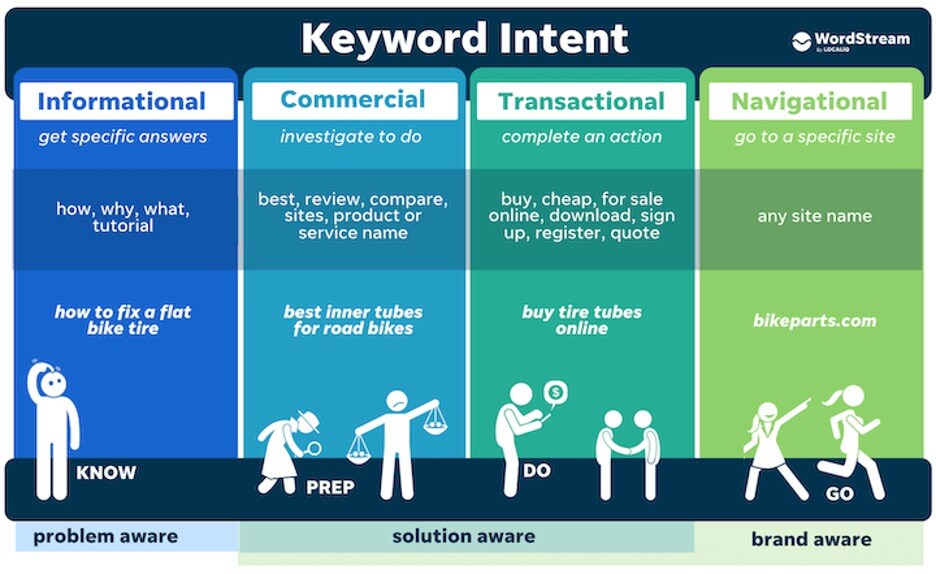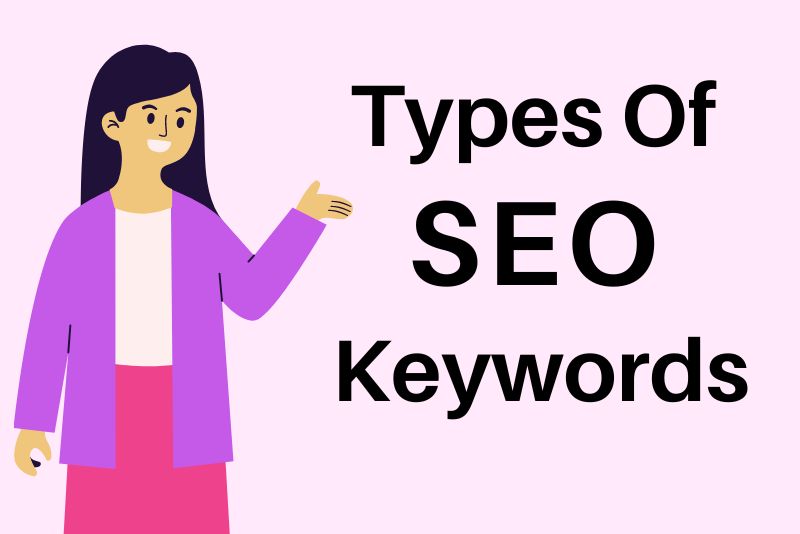Keywords are the lifeblood of any successful SEO campaign. They help you identify how users are searching for the products, services, and information that your business offers. But not all keywords are created equal!
Types of SEO Keywords – By Search Intent
Depending on your goals, there are different types of keywords you can use to reach potential customers. The types of keywords you use will depend on the search intent behind them. Here are four types of keywords to consider when creating your keyword list: Informational Keyword, Navigational Keyword, Commercial Keyword, and Transactional Keyword.
1. Informational Keyword
Informational keywords are queries used to answer a question or gain knowledge about a particular topic. These are search terms that people would type in the search engine if they want to find information about a certain topic. For example, someone searching for “how to fix a broken sink” is looking for answers and solutions, not necessarily your product or service.
Think of questions that customers might type into Google when researching topics related to your business, such as “What is SEO?” or “How does content marketing work?”
2. Navigational Keyword
Navigational keywords are used to find a specific website or web page. People use navigational keywords when they already know the website they want to visit and just need to type in the URL. If your business is a well-known brand, people might search for your business name as a navigational keyword.
For example, someone might type “Amazon” into the search engine to visit Amazon’s website directly. People often use phrases like “Bakery near me” or product names (like “KitchenAid dishwasher”) to get to the website they want.
You can also use navigational keywords to optimize your website so that it appears higher on search engine results pages (SERPs). This can help customers find you more easily and increase your traffic.
The below image will give you a better understanding of the four types of keywords.

3. Commercial Keywords
Commercial keywords are terms that indicate a customer’s intent to buy something or interest in specific products and services. Here customers are looking for information to help them make a choice about the product they wish to buy.
These are usually search phrases that include words like “best,” “top,” “price,” “reviews,” or other words that indicate comparison. For example, someone searching for the “best laptop for gaming” is likely looking to buy one and is trying to compare different models in order to make a decision.
Using commercial intent keywords can be a powerful way to drive conversions and sales for your business. This is the keyword you want to target if you’re hoping to reach customers who are looking to gather more information, are ready to make a purchase, or will soon be ready to make one.
4. Transactional Keywords
Transactional keywords are even more specific than commercial keywords. These search terms indicate a customer’s intent to purchase something immediately. They usually include words like “order,” “checkout,” or “buy now.”
For example, someone searching for “order KitchenAid dishwasher” is likely a qualified lead ready to buy. They want something specific, and keywords like “buy Joe’s Plumbing Services” or “order Sonic facial cleansing brush” will help them find what they’re looking for.
Transactional keywords are especially valuable because they indicate that the user is in the final stages of the buying process. If you’re trying to optimize your website for conversions, targeting transactional keywords is a great way to do that.
So if your business is about selling KitchenAid dishwashers, you should include transactional keywords like “buy KitchenAid dishwasher” and “KitchenAid dishwasher for sale”.
With good keyword research, you can identify which keywords will help customers find you easily and turn them into loyal customers.
Conclusion
Whether you’re looking to increase your web traffic, conversions, or both, the right keywords are key. By understanding the different types of keywords and their search intent, you can create an SEO strategy that will help you reach your target audience and grow your business online.
So take some time to consider the different types of keywords before you start writing content and optimizing your website. Don’t forget to use a keyword research tool to help you find the right keywords for your business and make sure that they are relevant to what you offer.
With good keyword research, you can identify which keywords will help customers find you easily and turn them into loyal customers.

